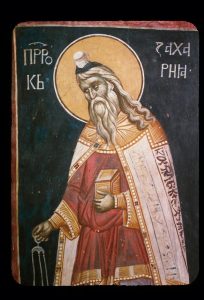 “Thus says the Lord: I have returned to Zion, and I will dwell within Jerusalem; Jerusalem will be called the faithful city, and the mountain of the Lord of hosts, the holy mountain. Thus says the Lord of hosts: Old men and old women will again sit in the streets of Jerusalem, each with staff in hand because of old age (Zechariah 8:1-2).
“Thus says the Lord: I have returned to Zion, and I will dwell within Jerusalem; Jerusalem will be called the faithful city, and the mountain of the Lord of hosts, the holy mountain. Thus says the Lord of hosts: Old men and old women will again sit in the streets of Jerusalem, each with staff in hand because of old age (Zechariah 8:1-2).
Zechariah was the prophet of the restoration of Jerusalem. In faith, we see this restoration in the coming of our Lord Jesus Christ. He was born in Bethlehem, in the environs of Jerusalem. He fulfilled the prophecy, “I have returned to Zion, and I will dwell in Jerusalem.” He is the light of the city. In the Feast of the Encounter, we see our Lord in Jerusalem, in its spiritual center, the temple and we see Zechariah’s prophecy fulfilled again. “Old men and old women will again sit in the streets of Jerusalem,” and in the present feast we see the old man Simeon and the old woman Anna in Jerusalem welcoming the coming of the Lord. Zechariah sees the Lord coming to Jerusalem as its king, prophesying Palm Sunday, “Exult greatly, O daughter Zion! Shout for joy, O daughter Jerusalem! Behold: your king is coming to you, a just savior is he, humble, and riding on a donkey, on a colt, the foal of a donkey” (Zechariah 9:9).
Zechariah thus sets the seal on our pilgrimage in the feast of lights, as we come to the spiritual Jerusalem, welcoming Jesus as our Savior, our priest and our king. To find life in him is the continual renewal of our faith.
Meditation by Archpriest David Petras
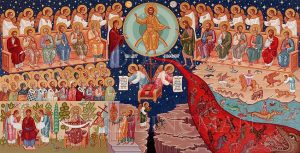 Today, the Church begins her preparations for the Great Fast ( aka, Great Lent).
Today, the Church begins her preparations for the Great Fast ( aka, Great Lent).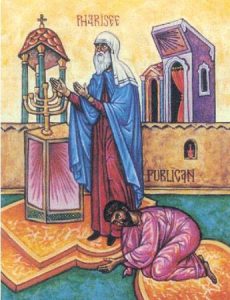 The journey of the feast of lights was a journey to specific holy places. It is a journey which we now make in spirit, in order to find the light of Christ. Soon after this journey, we begin another journey, going with our Lord to Jerusalem, as he foretold in the Gospel of St. Luke: “When the days for his being taken up (which John calls his glorification) were fulfilled, he resolutely determined to journey to Jerusalem.” During the Great Fast, then, we make another journey that ends in the holy city of Jerusalem, as Jesus said, “Yet I must continue on my way today, tomorrow, and the following day, for it is impossible that a prophet should die outside of Jerusalem” (Luke 13:33). But his death is his glorification, “by death he tramples death,” and it is the way to resurrection, to a resurrection promised to all. Our journey likewise ends in life (resurrection) and in light, as the Gospel of Paschal Sunday, the Day of Resurrection says, “ The light shines in the darkness, and the darkness has not overcome it” (John 1:5).
The journey of the feast of lights was a journey to specific holy places. It is a journey which we now make in spirit, in order to find the light of Christ. Soon after this journey, we begin another journey, going with our Lord to Jerusalem, as he foretold in the Gospel of St. Luke: “When the days for his being taken up (which John calls his glorification) were fulfilled, he resolutely determined to journey to Jerusalem.” During the Great Fast, then, we make another journey that ends in the holy city of Jerusalem, as Jesus said, “Yet I must continue on my way today, tomorrow, and the following day, for it is impossible that a prophet should die outside of Jerusalem” (Luke 13:33). But his death is his glorification, “by death he tramples death,” and it is the way to resurrection, to a resurrection promised to all. Our journey likewise ends in life (resurrection) and in light, as the Gospel of Paschal Sunday, the Day of Resurrection says, “ The light shines in the darkness, and the darkness has not overcome it” (John 1:5).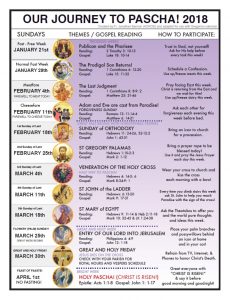
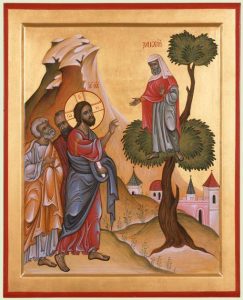 1 Timothy 4:9-16; Luke 19:1-10
1 Timothy 4:9-16; Luke 19:1-10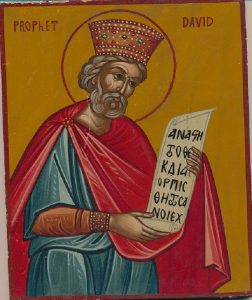 On this Sunday, we commemorate three men who had a relationship with Jesus: David, his forefather; Joseph, his foster father; and James, his brother through Joseph. Each of these man were shown mercy by God. David committed a great sin, to win the wife of Uriah, he had Uriah put into the front lines of battle, so that he was killed. The prophet Nathan brought this sin to light and David did repentance and lost his son.
On this Sunday, we commemorate three men who had a relationship with Jesus: David, his forefather; Joseph, his foster father; and James, his brother through Joseph. Each of these man were shown mercy by God. David committed a great sin, to win the wife of Uriah, he had Uriah put into the front lines of battle, so that he was killed. The prophet Nathan brought this sin to light and David did repentance and lost his son.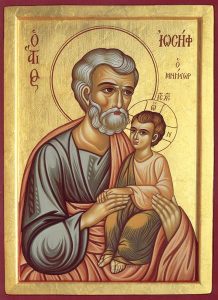 We might remember also three women who were among Jesus’ foremothers. Rachel was the wife of Jacob, who loved her more than Leah. However, when Jacob worked for seven years for Laban to win Rachel’s hand, Laban insisted he marry his eldest daughter Leah. Jacob then worked another seven years for Rachel. However, Rachel was barren until finally she gave birth to Joseph, Jacob’s favorite son. Jacob took his family and fled Laban, and Rachel stole Laban’s family icons. When Laban caught up with Jacob, Jacob cursed the thief of his icons, not knowing that it was his beloved wife Rachel. The curse was fulfilled when Rachel died giving birth to Benjamin. Rachel is mentioned in today’s Gospel as weeping when the children of Bethlehem are massacred by King Herod, but the gospel says, “no comfort for her, for they are no more.”
We might remember also three women who were among Jesus’ foremothers. Rachel was the wife of Jacob, who loved her more than Leah. However, when Jacob worked for seven years for Laban to win Rachel’s hand, Laban insisted he marry his eldest daughter Leah. Jacob then worked another seven years for Rachel. However, Rachel was barren until finally she gave birth to Joseph, Jacob’s favorite son. Jacob took his family and fled Laban, and Rachel stole Laban’s family icons. When Laban caught up with Jacob, Jacob cursed the thief of his icons, not knowing that it was his beloved wife Rachel. The curse was fulfilled when Rachel died giving birth to Benjamin. Rachel is mentioned in today’s Gospel as weeping when the children of Bethlehem are massacred by King Herod, but the gospel says, “no comfort for her, for they are no more.”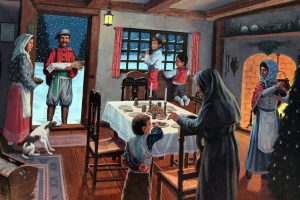 A twelve-dish Christmas Eve supper is traditionally prepared in many Eastern European and Northern European cultures, especially those that were formerly part of the Polish-Lithuanian Commonwealth, including Polish, Lithuanian and Ukrainian. The meal (Lithuanian: Kūčios, Polish: Wigilia or wieczerza wigilijna, Ukrainian: Свята вечеря, Sviata vecheria) consists of twelve meatless dishes representing the twelve months of the year. The tradition of the supper can be traced back to pre-Christian times and connected with remembrance of the souls of deceased ancestors.
A twelve-dish Christmas Eve supper is traditionally prepared in many Eastern European and Northern European cultures, especially those that were formerly part of the Polish-Lithuanian Commonwealth, including Polish, Lithuanian and Ukrainian. The meal (Lithuanian: Kūčios, Polish: Wigilia or wieczerza wigilijna, Ukrainian: Свята вечеря, Sviata vecheria) consists of twelve meatless dishes representing the twelve months of the year. The tradition of the supper can be traced back to pre-Christian times and connected with remembrance of the souls of deceased ancestors.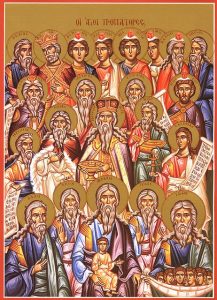 Colossians 3:4: “When Christ who is our life appears, then you also will appear with him in glory.”
Colossians 3:4: “When Christ who is our life appears, then you also will appear with him in glory.”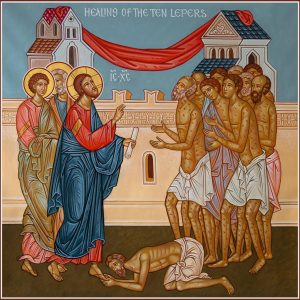 Ephesians 6:10-17; Luke 17:12-19
Ephesians 6:10-17; Luke 17:12-19